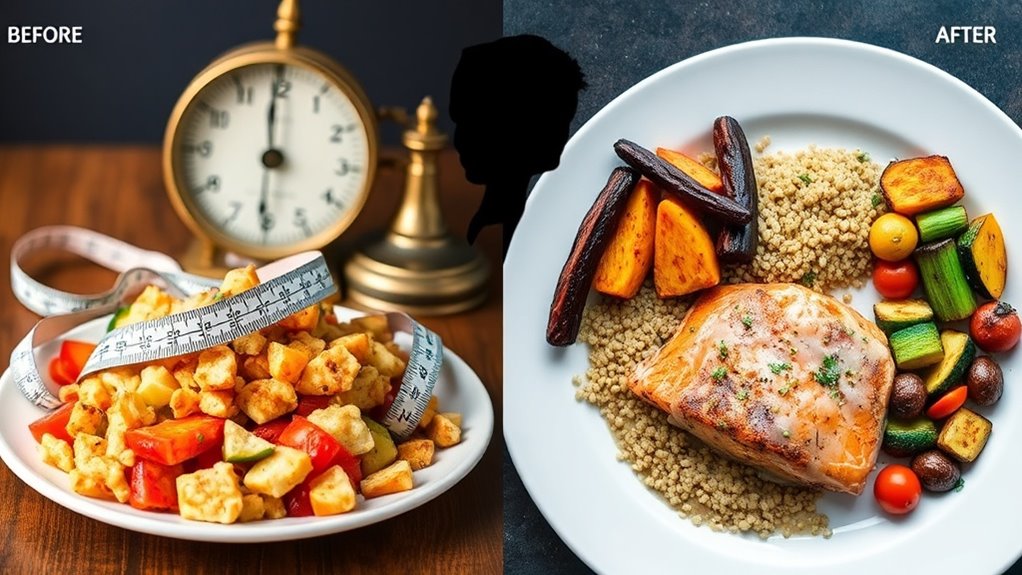What Happens If You Eat Only Whole Foods for a Month.
If you eat only whole foods for a month, you’ll likely notice clearer skin, increased energy, and improved digestion. You’ll feel fuller longer, which may help with weight loss and reduce cravings for processed snacks. Plus, your mood and mental clarity can improve thanks to nutrient-rich meals. Overall, this shift can lead to a healthier body and mind. There’s so much more to explore about these benefits and how to start your journey!
Understanding Whole Foods and Their Benefits
Whole foods are the cornerstone of a healthy diet, offering a wealth of nutrients and benefits.
When you choose whole foods for weight loss, you’re not just cutting calories; you’re nourishing your body with vitamins, minerals, and fiber.
Think fresh fruits, vegetables, whole grains, nuts, and lean proteins.
These foods are minimally processed, which means they retain their natural goodness and help you feel fuller longer. Whole grains are particularly beneficial as they enhance digestive health and regulate blood sugar levels.
Physical Changes After 30 Days
After a month of sticking to whole foods, you’ll likely notice significant physical changes.
Your skin might appear clearer and more radiant, reflecting the nutrients you’ve been fueling your body with. Weight loss is common, as whole foods tend to be lower in calories and higher in fiber, keeping you fuller longer. You may also experience increased energy levels, making everyday activities feel less daunting and more enjoyable.
Your digestion may improve, leading to less bloating and discomfort. You might find that your cravings for processed snacks diminish, replaced by a newfound appreciation for the natural flavors of fruits and vegetables. Incorporating whole foods into your diet can also support long-term weight management and overall health.
This journey can foster a sense of community, as you share recipes and experiences with others who are embracing whole foods too. Overall, these physical changes not only enhance your well-being but also create a deeper connection to your body, making you feel more vibrant and alive.
Mental and Emotional Effects
As you immerse yourself in a month of whole foods, you might find that your mental clarity improves significantly. The more nutrients you consume, the better your brain functions, and it can lead to uplifting emotional states.
You may notice:
-
Enhanced mood: Whole foods can boost serotonin levels, which might elevate your overall happiness.
-
Reduced anxiety: Eating nutrient-dense foods can calm your mind and help you feel more grounded.
-
Increased focus: With fewer processed ingredients, you could experience sharper concentration and better decision-making.
Connecting with others who share your whole foods journey can also foster a sense of community and belonging.
As you share recipes or experiences, you’ll likely feel more supported and understood. This emotional connection enhances not just your experience but also adds to the joy of your new lifestyle.
Additionally, prioritizing adequate rest can further enhance your overall well-being and support your whole foods journey. Embracing whole foods can truly nourish both your body and your mind.
Weight Loss and Body Composition
The positive changes in your mental state can often lead to a natural shift in your physical health, especially regarding weight loss and body composition.
When you choose whole foods, you’re nourishing your body with essential nutrients, which can help you feel more energized and satisfied. This shift can reduce cravings for unhealthy snacks, making it easier to maintain a balanced diet.
As you embrace whole foods, you may notice your body responding positively. Many people experience weight loss, not just from reducing processed foods but also from increased fiber intake, which promotes fullness.
You might find your muscle tone improving as you engage in more physical activities, inspired by your newfound energy. Additionally, staying hydrated is crucial for overall health, as it helps curb hunger and supports an active lifestyle.
Meal Planning and Preparation Tips
When you prioritize meal planning and preparation, you set yourself up for success on your whole foods journey.
By taking the time to plan ahead, you’ll not only save time during the week but also ensure you’re eating nourishing meals.
Here are some tips to help you get started:
-
Batch cook: Prepare larger portions of grains, beans, and roasted veggies to use throughout the week.
-
Create a weekly menu****: Designate specific meals for each day, making shopping and cooking much easier.
-
Use seasonal produce****: Incorporate fruits and veggies that are in season for the freshest flavors and the best nutrition.
Additionally, utilizing batch cooking allows for efficiency in meal prep, making it easier to stick to your whole foods plan.
Real-Life Testimonials and Experiences
Many people have transformed their lives by committing to eating whole foods for a month. You’ll often hear stories of increased energy, improved mood, and better digestion.
For instance, one participant shared how ditching processed foods made her feel lighter and more vibrant. She noticed her cravings for unhealthy snacks diminished, replaced by a newfound love for fresh fruits and vegetables. Friends have also reported better sleep and clearer skin after just a few weeks of whole foods.
You might connect with others who’ve experienced similar transformations, creating a sense of community. Sharing recipes and meal ideas can strengthen these bonds, making the journey enjoyable.
Many find that this lifestyle shift not only boosts their well-being but also inspires those around them to join in. Embracing whole foods for a month can be a powerful catalyst for change, fostering a sense of belonging among those seeking healthier, more fulfilling lives.





